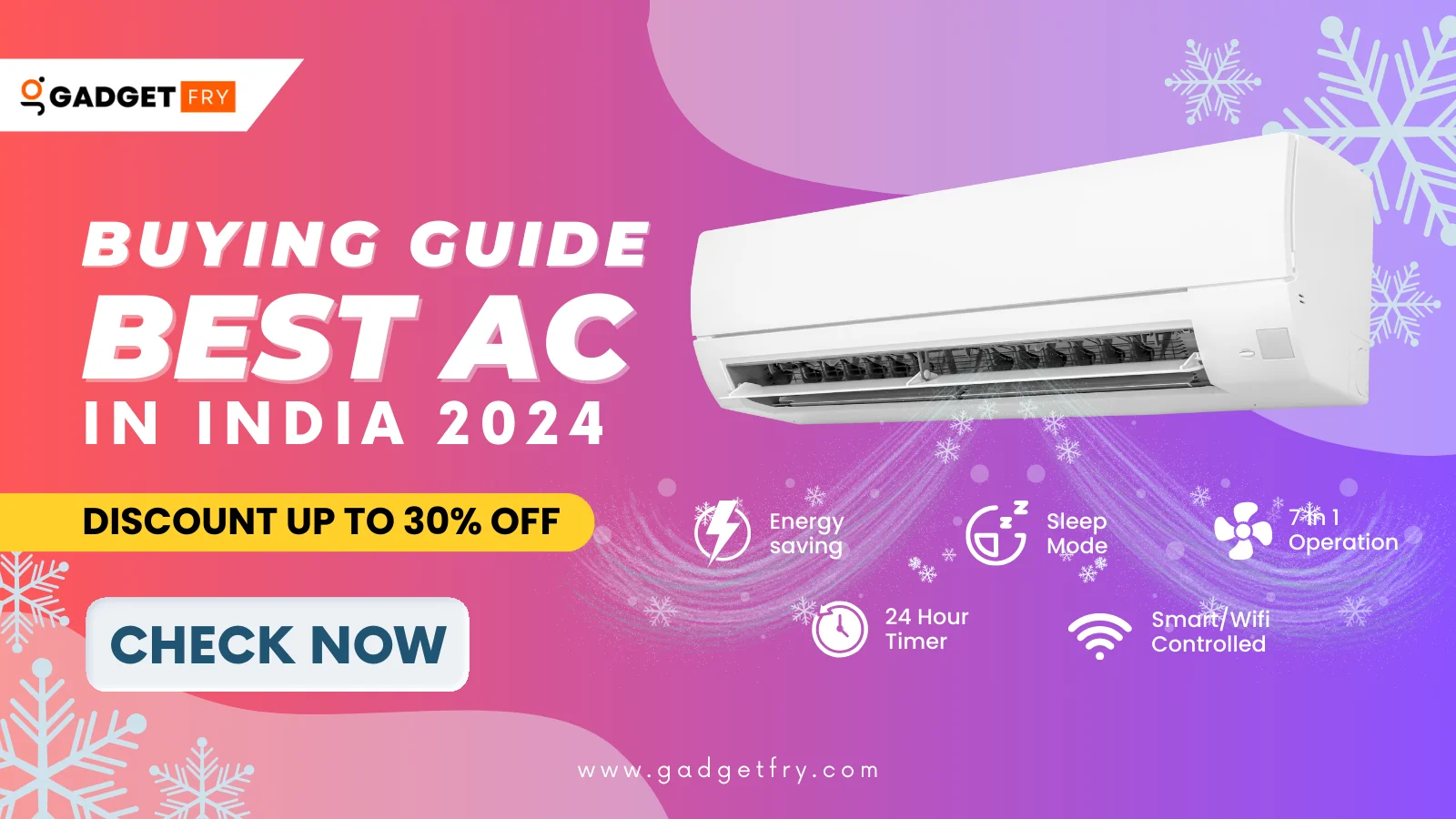
The heat of the summer has already begun, so purchasing an air conditioner has become essential. However, choosing a best AC under 40000 price bracket from the many options available can be overwhelming. The top air conditioners in India around 40,000 will be examined in this comprehensive buying guide for ACs.
Factor That Considered Before Buying Best AC Under 40000
Before we dig into the top AC under 40000 list, there are certain essential factors to consider before purchasing an AC in 2023, and here are some of them.
- Choose Right Room Size
- Inverter and Non Inverter AC
- Star Rating
- Cooling Capacity
- Noise Level
- Warranty
- Customer Service
ALSO READ – The Ultimate Guide to Finding the Best Laptop Under 30000 for Students, Office Uses
Room Size – Choose Capacity of AC according to your room size
The quantity of heat that an air conditioning (AC) unit can remove from a room in an hour is measured in tonnes, which is the capacity of the AC. Here is a general guide to assist you in choosing the right AC capacity for your space:
| AC Capacity | Room Size | AC Capacity (For Direct Sun Light)* |
| 0.75 Ton | 80-120 Square feet | 1 Ton |
| 1 Ton | 120-180 Square feet | 1.5 Ton |
| 1.5 Ton | 180-250 Square feet | 2.0 Ton |
| 2 Ton | 250-300 Square feet | 2.0 Ton |
AC capacity that you use may change, its depend on the room’s height, insulation, number of windows, and regional climate so keep this on your mind. If you’re unclear of the right amount of AC for your space, it’s advisable to speak with an HVAC expert who can provide a more precise evaluation. For the best cooling and energy efficiency, it’s critical to choose the correct capacity for your air conditioner.
Type of AC
There are several types of air conditioning (AC) systems available, each with its own set of advantages and disadvantages. The most common types are as follows:
- Window AC: This sort of AC unit is meant to cool a single room and is positioned on a window. They are often less expensive and easier to install, however they can be noisy and inefficient in comparison to other varieties.
- Split AC: Split AC units have two separate components: an inside unit and an outside unit. The indoor unit is put on a wall within the room, while the outdoor unit is installed outside the structure. In general, they are more energy-efficient and quieter than window units.
- Portable AC: This portable air conditioner has wheels and can be transported from one room to another. They are less powerful than window or split units, but they are easier to install and do not require permanent installation.
- Central AC: This kind of air conditioning system is designed to cool an entire building or home. It has a central unit that cools and circulates air to each room via ductwork. They are the most expensive and necessitate professional installation, but they deliver consistent cooling throughout the building.
- Ductless Mini-Split AC: This type of air conditioning system is similar to a split system but does not require ductwork. They feature zone cooling, which allows you to chill different rooms or sections individually, and are ideal for homes or offices.
The sort of AC unit you choose will ultimately depending on your specific needs and budget. Consider the size of the space, energy efficiency, noise level, and installation requirements before making a purchase.
Difference between Inverter and Non-Inverter AC
The biggest difference between an inverter and a non-inverter air conditioning (AC) system is how the compressor speed is controlled to manage room temperature. Here’s a breakdown of the distinctions:
Inverter Technology
The Inverter compressor can thinks and adjusts to what you need. The compressor has variable speed and frequency that adjusts depending on the temperature. It is worthwhile to invest in a longer-lasting, more energy-efficient air conditioner.
Advantages of Inverter ACs:
- Compressor Speed: In non-inverter air conditioners, the compressor has a fixed speed and is either on or off. This causes a quick surge of cool air when the air conditioner is turned on, followed by periods of no cooling. Inverter air conditioners, on the other hand, have a variable-speed compressor that can change its speed based on the temperature of the room. This gives a more consistent and even cooling experience as the compressor can slow down or speed up as needed.
- Energy Efficiency: Inverter air conditioners are generally more energy efficient than non-inverter air conditioners since they do not have to turn on and off repeatedly to maintain the desired temperature. Instead, the compressor adjusts its speed to match the room’s cooling needs, resulting in less energy waste and less expensive electricity costs. Inverter air conditioners use less energy because the compressor does not have to achieve maximum cooling speeds as frequently.
- Noise Level: Inverter ACs are typically quieter than non-inverter ACs because they operate at a lower sound level due to their variable speed compressor.
- Cost: Inverter air conditioners are often more expensive than non-inverter air conditioners since they require more modern technology and components. However, the cost can be mitigated by the energy savings and enhanced comfort that they bring.
Energy Star Rating
Higher star ratings cost a bit more initially but consume much less power, and hence save money on your electricity bill in the long run. Compressor material in the AC also contributes to energy consumption. Compressors made of copper are more energy efficient than aluminium ones. It also depend upon your uses in a month or in a year, please check below.
Note – If your daily use is 4-5 hours in a day and 3-4 months in a year then you should go with 3 star AC while if your daily use is 6-8 hours and 5-7 months in a year you should go with 5 star AC.
Latest BEE SEER ranges for Split and Window As for the period of 1st Jul’22 to 31st Dec’24.
Energy saving in Split AC
| Star | ISEER (kWh) Min – Max | Energy Saving As Compare to 2 Start |
| 1 | 3.3 – 3.49 | |
| 2 | 3.5 – 3.79 | |
| 3 | 3.8 – 4.39 | 3 Star Split AC will be ~12% more energy saving than a 2 star Split AC |
| 4 | 4.4 – 4.99 | 4 Star Split AC will be ~29% more energy saving than a 2 star Split AC |
| 5 | 5 | 5 Star Split AC will be ~41% more energy saving than a 2 star Split AC |
Energy saving in Windows AC
| Star | ISEER (kWh) Min – Max | Energy Saving As Compare to 2 Start |
| 1 | 3.3 – 3.49 | |
| 2 | 3.5 – 3.79 | |
| 3 | 3.8 – 4.39 | 3 Star Window AC will be ~7% more energy saving than a 2 star Window AC |
| 4 | 4.4 – 4.99 | 4 Star Window AC will be ~13% more energy saving than a 2 star Window AC |
| 5 | 5 | 5 Star Window AC will be ~20% more energy saving than a 2 star Window AC |
A higher-rated air conditioner may be more expensive at initially, but it will save you money on your utility bills in the long run. It’s important to remember that the star rating system is updated every few years to reflect technological advancements. When buying an air conditioner, always look for the most recent star rating.
Extra features
Modern air conditioning (AC) units frequently have a variety of added functions that can improve comfort and convenience. Here are some of the most familiar additional features found in an air conditioner:
- Remote Control: Most air conditioners come with a remote control that allows you to change the temperature and other settings from across the room.
- Timer: A timer option allows you to programme your air conditioner to switch on or off at a specific time, which can help you save energy and money.
- Sleep Mode: This option gradually adjusts the temperature throughout the night to help you sleep better.
- Dehumidifier: Some air conditioning systems include a dehumidifier function that removes excess moisture from the air, making your environment more pleasant and less prone to fungal formation.
- Air Purifier: Some air conditioner units integrate an air purifier that filters out dust, pollen, and other allergens, resulting in cleaner air.
- Auto-Cleaning: Some air conditioners have a self-cleaning mode that removes dust and grime from the unit, increasing efficiency and reducing the need for maintenance.
- Wi-Fi Connectivity: Some high-end AC units include Wi-Fi connectivity, allowing you to manage the unit via a smartphone app or voice commands.
- Warranty: Always search for a warranty that is more than a year.
All of these added features can improve the comfort and convenience of your air conditioner, but they may also raise the price. When selecting an air conditioner, consider which characteristics are most important to you and what your needs are.
Here are the Top Best AC Under 40000
There are several good AC options available under 40000. Here are some of the best ones to consider:
1. Panasonic Wi-Fi Smart Inverter Split AC
Because of its features, the Panasonic Wi-Fi Smart Inverter Split AC is our first option. It is available in 1 Tonne, 1.5 Tonne, and 2 Tonne capacities, with 5 and 3-star ratings. The Panasonic Smart AC has smart features as well as efficient cooling capabilities. It includes a Wi-Fi inverter, which allows you to operate and monitor the air conditioner remotely using your smartphone or voice commands.
The copper condenser in the AC is well-known for its strong heat transmission capabilities and durability. It has a 7-in-1 convertible mode that allows you to vary the cooling capacity based on your demands, and an AI mode that optimises cooling performance automatically.
The air conditioner has a 4-way swing function that ensures even cooling across the room. It also comes with a PM 0.1 air purification filter, which effectively removes ultrafine particles, allergens, and pollutants from the air, resulting in better and healthier indoor air quality. Panasonic’s 2023 model portfolio includes the AC, which comes in a clean white style.
Comparison between 1 Ton, 1.5 Ton, 2 Ton
| 1 Ton | 1.5 Ton | 2 Ton | |
| Price Range | 35K-37K | 40K-43K | 55K-62K |
| Room Size | 120sq | 180sq | 250sq |
| ISEER Rating | 5.10 | 5.10 | 5.10 |
| Model | 2023 | 2023 | 2023 |
| Yearly Consumption | 525 Unit | 774 Unit | 925 Unit |
| Wattage | 3450W | 5100W | 6100W |
| Noise Level | 35db | 36db | 40db |
| Check Price | Amazon, Flipkart | Amazon, Flipkart | Amazon, Flipkart |
2. Daikin 5 Star Inverter AC with PM 2.5 Filter
The Daikin 5 Star Inverter AC with PM 2.5 Filter split AC offers efficient cooling and advanced features. It comes with a 5-star and 3-star energy efficiency rating option, indicating its ability to save electricity and reduce energy bills. The AC features an inverter compressor, which adjusts its speed based on the cooling needs, ensuring precise temperature control and energy efficiency.
It has a copper condenser, which provides good heat transfer and durability. The air conditioner also comes with a PM 2.5 filter, which efficiently eliminates fine particles, pollutants, and allergens from the air, so improving indoor air quality.
Comparison between 1 Ton, 1.5 Ton, 2 Ton
| 1.5 Ton | 1.8 Ton | |
| Price Range | 40K-42K | 50K-56K |
| Room Size | 180sq | 250sq |
| ISEER Rating | 5.20 | 5.20 |
| Model | 2023 | 2023 |
| Yearly Consumption | ~ 780 Unit | ~ 930 Unit |
| Wattage | 5200W | 6200W |
| Noise Level | 38db | 38db |
| Check Price | Amazon, Flipkart | Amazon, Flipkart |
3. LG AI Convertible 6-in-1 Cooling Dual Inverter Split AC
The LG AI Convertible 6-in-1 Cooling Dual Inverter Split AC is one of the most selling split AC in the Indian market which comes with great new features and tech. It features AI DUAL Inverter technology for optimized compressor speed and precise temperature control.
The AC offers customizable cooling modes with its Super Convertible 6-in-1 Cooling feature. It has a copper condenser with Ocean Black Protection for durability and resistance against corrosion. The AC also includes an HD filter with anti-virus protection to remove dust and harmful particles from the air.
It is part of LG’s 2023 model lineup and is available in a stylish white color. Overall, the LG RS-Q19YNZE provides efficient cooling, advanced features, and a durable build for a comfortable indoor environment. If you want to buy 3 star LG Ai Dual Inverter Split AC then you can also check out.
Comparison between 1 Ton, 1.5 Ton, 2 Ton
| 1.5 Ton 5 Star | 2 Ton 3 Star | |
| Price Range | 40K-42K | 50K-55K |
| Room Size | 180sq | 250sq |
| ISEER Rating | 5.20 | 3.96 |
| Model | 2023 | 2023 |
| Yearly Consumption | ~ 680 Unit | ~ 1230 Unit |
| Wattage | 4600W | 6300W |
| Noise Level | 31db | 31db |
| Check Price | Amazon, Flipkart | Amazon, Flipkart |
FAQs
Sure, here are some frequently asked questions (FAQs) about air conditioning (AC) that may help you:
What is the ideal temperature to set my AC to?
The ideal temperature for your AC depends on personal preference, but generally, setting it between 22-25°C (72-77°F) is comfortable for most people.
How often should I clean or replace the air filter in my AC?
It’s recommended to clean or replace the air filter in your AC every 3-4 months or as directed by the manufacturer. However, if you live in a dusty or polluted environment, you may need to clean or replace the filter more frequently.
How do I know what size AC unit to buy for my room?
The size of your AC unit should match the size of your room. For your reference you can checkout our details articles thats include room size chart.
Can I install my AC unit myself?
While some AC units can be installed as a DIY project, it’s recommended to hire a professional installer to ensure proper installation, safety, and efficiency.
What is the difference between a window AC and a split AC?
Window air conditioners are designed to be positioned in a window, whereas split air conditioners are made up of two units: an indoor unit hung on the wall and an outdoor unit that sits outdoors. Split air conditioners are normally more expensive, but they provide quieter operation and greater flexibility in terms of installation placement.
What is the lifespan of an AC unit?
The lifespan of an AC unit depends on several factors, including the brand, usage, maintenance, and quality of installation. On average, an AC unit can last anywhere from 10-15 years.
Should I choose an inverter or non-inverter AC?
Inverter AC units are more energy-efficient and provide more uniform cooling. I suggest you to go with Inverter technology.
How often should I have my AC serviced?
It’s recommended to have your AC serviced by a professional at least once a year to ensure proper operation, efficiency, and safety.
Can an AC unit also be used as a heater?
Some AC units have a heating function that can be used to warm up a room during colder months. These units are called heat pumps or reverse cycle air conditioners.
Which is the Best AC Brand?
Choosing the best AC brand can be subjective and may vary depending on personal preferences, budget, and specific requirements. However, there are several well-known and reputable AC brands that are known for their quality, reliability, and customer satisfaction. Like LG, Panasonic, Daikin, Voltas
Which is Best AC in India?
There are several top AC models that are widely regarded for their performance, energy efficiency, and customer satisfaction. Please check our full list that also has comprehensive buying guide.









